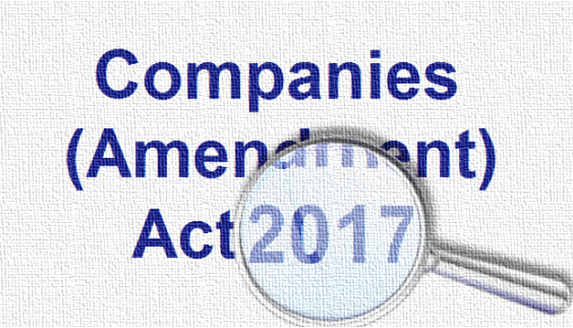CA Foundation Exam > CA Foundation Notes > Business Laws for CA Foundation > Companies (Amendment) Act, 2017
Companies (Amendment) Act, 2017 | Business Laws for CA Foundation PDF Download
Overview
The central Government notified the amendments to the Companies Act 2013 so as to make the insolvency process more effective. The Companies Act 2013 were one of the most significant reforms made in India which aimed to bring Indian companies law in line with the global standards.
Background
- The Act was first introduced in 2016 which was then referred to the Standing Committee on Finance. The Cabinet took into considerations the recommendations of the panel, the bill was renamed as the Companies (Amendment) Bill, 2017.
- In the winter session of the Parliament held recently, the Companies (Amendment) Act, 2017 got a nod from the Parliament. Both the houses of the parliament cleared the Companies (Amendment) Bill, 2017 and it further received the assent of the President
The Amendment Act
This Act aims to strengthen the corporate governance standards and initiate strict actions against the defaulter companies thus improving the ease of doing business in India.The top changes in the Act are as follows-
Harmony with RBI and SEBI
- In order to align the Act with various rules and regulations of the SEBI (Security Exchange Board of India) and the RBI (Reserve Bank of India), several provisions have been amended.
- Sections 194 and 195 of the Act which used to deal with issues like insider trading and forward dealing have now been omitted since the SEBI regulations are sufficient enough to deal with such frauds.
- The definition of the debenture is also amended so that the RBI is able to disqualify certain instruments as debentures.
Rationalization of Penalties
- Now while levying the quantum of penalty certain factors would be taken into considerations. These factors include the size of the company, nature of the business, the nature and gravity of the default etc.
- With respect to factors for determining the level of punishment, two new sections are inserted.
- Penal provisions for small companies and one person companies are reduced.
Simplifying the private placement process
- The private placement process is made easier. The separate offer letter details to be kept by the company will no longer be used and the number of fillings to the Registrar is reduced.
- The company will not be allowed to utilize the money raised through private placement until and unless allotment has been made and the return of allotment has been filed with the registrar.
- The disclosures are made under Explanatory Statement referred to in Rule 13(2)(d) of Companies (Share Capital and Debentures) Rules 2014 to ensure that the investor gets adequate information about the company.
Loans to Directors
- To address the difficulties faced during transactions due to the ban on providing loans to subsidiaries with common directors this provision has been included.
- Now the companies can give loans to entities in which the Directors are interested.
- The Act divides the regulatory framework into two categories-first consisting of transactions which are prohibited and the other consisting of transactions which may be permitted but these are subject to the approval of the shareholders.
Disqualification for Independent Director
- Section 149 deals with the qualifications and disqualifications of the independent Directors. Section 149(6) provides for various disqualifications for becoming an independent Director. One of such people is someone having “pecuniary relationship” with “the company, its holdings, subsidiary or associate company, or their promoters or directors.”
- The pecuniary relationship excludes the remuneration to such director or having transaction not exceeding 10% of his total income or the amount prescribed.
Prior Approval of creditors
- As per the new provisions, now the companies which have defaulted on their dues to the financial institutions will be requiring a prior approval of these creditors. It is also required to take approval at a general meeting in case the payment of the managerial remuneration exceeds 11% of the net profits.
- Earlier the companies had to only take prior approval at the general meeting.
The document Companies (Amendment) Act, 2017 | Business Laws for CA Foundation is a part of the CA Foundation Course Business Laws for CA Foundation.
All you need of CA Foundation at this link: CA Foundation
|
32 videos|251 docs|57 tests
|
Related Searches
















